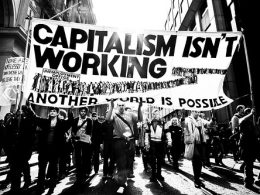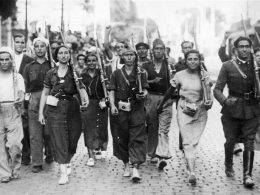By Eddie McCabe
James Connolly once wrote that “successful revolutions are not the product of our brains but of ripe material conditions.” What he meant was that socialists can’t just make a revolution because they want to. No matter how many socialists there are (and in normal times it will always be a minority), and no matter what they do, they can’t simply by dint of arguments or actions induce the mass crisis of confidence in the system that gives rise to revolution. Capitalism is too powerful to be overthrown by ideas alone.
But the confidence socialists have in the potential for, and even the prospect of, revolutionary change, comes from an understanding of the contradictions inherent in capitalism itself. Yes, capitalism is an amazingly powerful system, but it is also its own worst enemy. The dynamism that once made it incredibly productive also made it incredibly destructive, and in this era – of inequality, war, pandemics and ecological crisis – it is particularly self-destructive.
That’s not to suggest that the end of capitalism, especially as a result of revolution, is in any way inevitable; far from it. But what is certain is that worsening capitalist crises will lead to immense change in the coming decades. Whether for better or worse depends on what we do. Because we – the working-class majority – can act to shape that change, provided we’re organised.
The fact is that capitalism’s most self-destructive feature remains, as Marx and Engels wrote, its perpetual production of its own ‘gravediggers’ – the workers of the world. These billions of exploited and oppressed people, whose labour produces all the goods and services upon which society relies, and whose fundamental aspirations cannot be fulfilled under this system, make up the most powerful social force that’s ever existed.
Unfortunately its power is all too often latent power. Yet over the past 200 years it’s been demonstrated time and again, in wildly varying measures to be sure – from protests, to strikes, to insurrections. It can be expressed in ways that are largely spontaneous – explosions of collective outrage at injustice. But for it to be harnessed most effectively, organisation is essential.
Indeed, organisation comes naturally to the working class, whose very existence is defined by its exploitation by capitalists. To win any social rights or economic gains, and to defend them, requires coming together and acting in our shared interests. So whether in campaigns on particular issues, or in trade unions or political parties, or in combinations of these, the working class has been able to force through progress – from the right to vote, to the provision of welfare, to time off at the weekend. This goes for all the other things we often take for granted, none of which was just granted by the system.
In fact, the system constantly seeks to undermine and overturn these gains, as well as block any new ones. Campaigns, trade unions and political parties (left reformist ones) all play a role in making life for working-class people more bearable within this capitalist system, which ultimately sees all people and the planet merely as resources to be exploited for profit.
What those organisations don’t do, however, is strive for an alternative to that system. This is a decisive weakness in two main ways: Firstly, their inability to see beyond the limits of capitalism means that their demands will always be too limited. Likewise their methods of how to achieve these demands – negotiation over strikes, parliament over struggle. Hence, even their ability to win reforms is less effective.
Secondly, while they can play a key role in mobilising workers and young people into activity, their reformist convictions (illusions in the system and fear of radical change) mean that when struggles reach their highest points – when revolution presents – these organisations actually become a block on further progress; inevitably betraying the interests of those they represent. And this more often leads not to half-measures – but utter calamity.
The only way to prevent such eventualities is to ensure an alternative, revolutionary leadership exists to challenge reformist betrayal. That means building a revolutionary party. In short, this is a party with a Marxist programme – the distillation of all the lessons of revolutionary working-class history; and crucially, one that’s grounded in the struggles of the working class and oppressed.
If organised and mobilised the working class can overthrow capitalism; that shouldn’t be in doubt. It just can’t do it without such a party and leadership.












